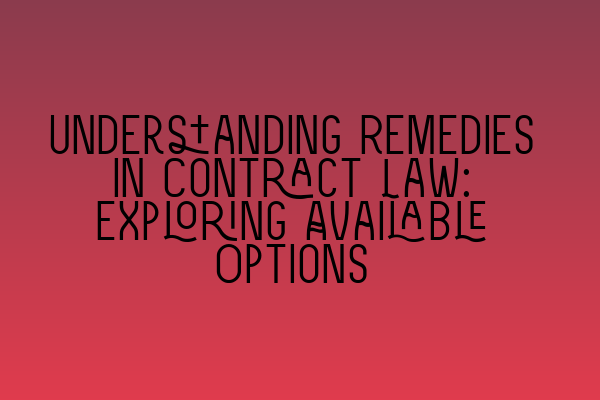Understanding Remedies in Contract Law: Exploring Available Options
In contract law, remedies play a crucial role in resolving disputes and enforcing obligations. When a party breaches a contract, the other party is entitled to seek a remedy to address the harm caused. Understanding the available remedies is essential for any solicitor practicing contract law. In this article, we will explore the various options for remedies and provide an in-depth understanding of each.
1. Damages:
Damages are the most common remedy sought in contract law cases. It is a monetary award intended to compensate the non-breaching party for the loss suffered as a result of the breach. There are two types of damages:
– Compensatory Damages: These damages aim to put the non-breaching party in the position they would have been if the contract had been performed. It includes direct losses, such as the cost of replacing defective goods, as well as indirect losses, such as loss of profit.
– Consequential Damages: This type of damages covers losses that are not directly caused by the breach but are a foreseeable consequence of the breach. For example, if a supplier fails to deliver goods on time, resulting in a loss of a lucrative contract, the non-breaching party may be entitled to consequential damages.
To learn more about damages in contract law, you can check out this article on SQE Contract Law: SQE 1 Practice Exam Questions.
2. Specific Performance:
Specific performance is an equitable remedy where the court orders the breaching party to fulfill their contractual obligations. This remedy is available when damages are not an adequate remedy or when the subject matter of the contract is unique, such as in cases involving land or rare collectibles. Specific performance is generally only granted if the court believes the party can fulfill their obligations.
To gain a deeper understanding of specific performance, SQE Contract Law offers a comprehensive course on SQE 1 Practice Mocks FLK1 FLK2 where you can explore real-life scenarios and learn about the intricacies involved.
3. Injunctions:
An injunction is a court order that requires a party to either do or refrain from doing a specific act. It is another equitable remedy used in contract law to prevent a party from breaching contractual obligations. Injunctions can be temporary (interlocutory) or permanent (final), depending on the circumstances. For example, if a party threatens to disclose confidential information in violation of a non-disclosure agreement, the other party can seek an injunction to prevent them from doing so.
To delve deeper into injunctions and how they apply in contract law, SQE Contract Law offers an extensive course on SQE 2 Preparation Courses. The course covers different types of injunctions and the legal requirements to obtain them.
4. Rescission:
Rescission is a remedy that aims to return the parties to their pre-contractual position by canceling the contract and restoring any benefits received. It is commonly sought when there has been a fundamental misrepresentation, mistake, or duress that led to the formation of the contract. Rescission essentially voids the contract and releases both parties from their obligations.
For a comprehensive understanding of rescission and its applications, SQE Contract Law offers a specialized course on SQE 1 Preparation Courses. The course delves into the intricacies of misrepresentation, mistake, and duress as grounds for seeking rescission.
5. Restitution:
Restitution is a remedy that focuses on restoring the non-breaching party to their pre-contractual position by requiring the breaching party to give up any unjust enrichment obtained. It is sometimes sought in addition to other remedies to ensure fairness and prevent the breaching party from benefiting from their wrongdoing.
To learn more about the principles of restitution and its applicability in contract law, SQE Contract Law offers valuable insights in their article on SRA SQE Exam Dates. The article explores key cases and legal principles related to restitution.
Conclusion:
Understanding the available remedies in contract law is crucial for solicitors to effectively represent clients and seek appropriate solutions in case of a breach. Whether it’s seeking damages, specific performance, injunctions, rescission, or restitution, each remedy serves a specific purpose and has its own legal requirements. By having a comprehensive understanding of these remedies, solicitors can provide effective legal counsel and achieve favorable outcomes for their clients.
For further resources and practice opportunities in contract law, you can explore the various courses offered by SQE Contract Law, such as SQE 1 Practice Exam Questions, SQE 1 Practice Mocks FLK1 FLK2, and SQE 2 Preparation Courses. These courses provide comprehensive guidance, exam preparation materials, and real-life scenarios to enhance your understanding of contract law and remedies.
